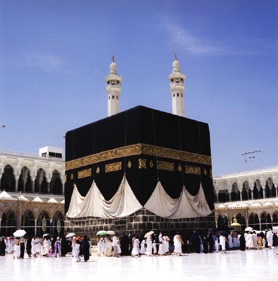Many Muslims Hold to Ancient Superstitions
Spells are often given out for love, children and protection
Charms are commonly worn in clothes for protection.
Curses are given as well, to bring harm or limiting pregnancies
Many sites around the East have shrines to believers who are considered helpful to the visitors.
Charm to ward off evil
Evil Eyes
Many Muslims have a great many ancient beliefs in the spiritual world that prevailed long before Islam came into being. One of the most obvious examples is that of the belief in the “evil eye”. This belief goes back to the early civilizations, some credit the ancient Egyptians, as one of the popular icons is that of the Eye of Horis, a god that could be of protection or destruction. But the belief that we all in some way have the power to curse just by looking at someone remains within the modern Islamic world. Many modern Muslims protect themselves from this spiritual attack by wearing on their person a blue bead, or to protect their home or business one might find a blue eye bead hanging. (If you fly on Turkish Airlines, you might notice the blue eye in the plane, as a part of the decoration.) One might even give the “evil eye” to someone unknowingly! Giving compliments within the Muslim world especially to babies or small children can be tricky, as a compliment to the beauty of the baby might draw the evil eye to the innocent child and curse it. Many Muslims draw Allah into their compliments, so as to protect the child. We have known some to actually tell others they have fewer children than they do, so as to not attract the evil eye to the blessed family. Most often the evil eye is associated with envy or jealousy. Another attribute that comes with this is favor. Finding favor in someone’s eyes is a universal expression in the Semetic culture. Another expression that we will find familiar is “the apple of his eye”. We find references to these many times in the Bible. In 1 Sam 18:9-10 “And from that time on Saul kept a jealous eye on David. The next day an evil spirit from God came forcefully upon Saul.” We see that the jealous eye that Saul had for David certainly ended badly for Saul.
Christ said,
“The eye is the lamp of the body; so then if your eye is clear, your whole body will be full of light. But if your eye is bad, your whole body will full of darkness.” Matt 6:22-23
These references to the eye reflect the feeling that indeed the eye is the window of the soul and what the yearning of the soul will be reflected in it. The difference for the Muslim is that the power of the jealousy can influence the innocent, whereas we see that the evil of the eye infects the person who has the evil eye not the person he/she looks upon.
Muslims believe in Jinn, or as we ritual westerners might call them genii. Which in Islam are spiritual beings who have the capacity for great evil or possible protection. There are many things done to protect oneself from the Jinn, prayers, beads, spitting, spells, and avoidance of known “evil” areas. When asking a Muslim about these things one might get a variety of answers, depending on how religious the person is, and where they grew up. But they all feel fear at risking the evil that is in such as the unknown. ‘Better safe than sorry’ is the motto for even modern Muslims. As Christians we might recognize a great many of the traits of the Jinn as demonic, but in Islam not all Jinn are evil in nature but can cause mischief and with a certain amount of cleverness one might gain power over the Jinn. (As seen in the Arabian Nights.) This is the way of many ancient people explained situations that they had no answers for in their world. (Note the root of the word Jinxed.) One never would want to attract the attention of these Jinn, thus compliments are turned away, and happy occasions require many blessings and possibly spells to keep these unknown at bay. The idea being turning away the eyes of the unknown spiritual beings who might bring harm.
We are thankful that in Christ we have nothing to fear, as we rest in His hand. May we have compassion on those who live in the world of fear and superstitions and pray that these bonds of fear will be broken in their coming to Christ. May we in our work find favor in the eyes of our Lord so that our hands and work will be blessed in Him.

Many of the customs of Hajj pilgrimage were adapted from the pagen customs of Arabia, the stone itself, that they encircle has been a site of ancient worshippers many centuries before Muhammad and Islam came to be.

The hand of Fatima, or Hamza is a common symbol throughout the East as a symbol of protection.
